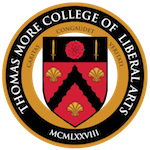
The Thomas More College of Liberal Arts
Six Manchester Street
Merrimack, NH 03054
Phone: (603) 880-8308
Fax: (603) 880-9280
Contact via email
Copyright © 2025 Thomas More College of Liberal Arts. All rights reserved.
There are some who through knowledge of things natural construct a ladder by which to rise to the contemplation of things supernatural; they build a path to theology through philosophy and the liberal arts . . . they adorn the queen of heaven with the spoils of the Egyptians.
–St. Thomas More, Letter to the Guild of Masters of the University of Oxford
In his celebrated Regensburg Address, Pope Benedict XVI declared that the virtue most required today by those who seek the truth is nothing less than a kind of intellectual fortitude: the “courage to engage the whole breadth of reason.” It is a program with which St. Thomas More would have heartily agreed. For More not only championed Classical languages, but—as the passage above indicates—he also eloquently affirmed the noble task of the other liberal arts and of philosophy to prepare the mind for the arduous ascent towards wisdom.
At Thomas More College, students begin the path to wisdom—natural and revealed—with courses that seek to attune their senses to the beauty and intelligibility of the Creation. In the Way of Beauty sequence, they learn to discipline their eyes, ears, hands, and even their voices, as they ponder the mysteries of proportion in the visual arts and music. Coupled with courses in Euclidean Geometry and Astronomy, the Way of Beauty sequence helps to reveal the sacred arithmetic and geometry built into the Creation and the human mind.
In the second year of studies, students are introduced to the art of logic as taught by the man Dante called “the master of those who know,” Aristotle. Especially in Logic, but also more generally in all of our philosophy classes, we rely heavily on Aristotle’s guidance because, as John Henry Cardinal Newman pointed out, it was Aristotle’s great gift to have “told us the meaning of our own words and ideas, before we were born.” Though his philosophy has been hallowed by centuries of use and is, therefore, often thought of as a system to be imbibed or rejected as a whole, at Thomas More College we regard Aristotle as a master because he respects the beginnings of wisdom revealed in our common use of language, asks questions of universal interest, and insists upon an orderly pursuit of truth.
(2 semesters of 3 credits each semester)
These courses train the student in the art of geometry according to the method of Euclid. Students master the first six books of Euclid’s Elements. The discussion of the principles and definitions proper to the art will be followed by the examination of the theorems, which are presented publicly and from memory by the students.
(2 semesters of 3 credits each semester)
These courses develop the students’ wonder at the splendor and intelligibility of the Creation through extensive field and laboratory study. Students will learn to identify the principal trees and common birds of our campus and study the ecology of the White Pine-Red Oak-Maple transitional forests that characterize the lower Merrimack Valley. Texts are drawn from the writings of ancient and modern students of nature, as well as from the writings of prominent New England naturalists.
(3 credits during first year of studies)
This course develops the students’ ability to appreciate the splendor and intelligibility of the Creation through study of the world’s oldest and most prolific science. Students will learn the development in the description of the kinetic movement of the heavens while making a good beginning in the fundamentals of the scientific method. Texts are drawn from the writings of ancient and modern students of astronomy including Ptolemy, Copernicus, and Johannes Kepler.
(3 credits during second year of studies)
A course of training in the art of reasoning according to the doctrine of Aristotle. Students will refine their ability to use language in the pursuit of truth by studying substantial portions of Plato’s Meno and Aristotle’s Categories, On Interpretation, and Prior Analytics, as well as shorter selections from the Posterior Analytics, Topics, Sophistical Refutations, and Rhetoric.

The Thomas More College of Liberal Arts
Six Manchester Street
Merrimack, NH 03054
Phone: (603) 880-8308
Fax: (603) 880-9280
Contact via email
Copyright © 2025 Thomas More College of Liberal Arts. All rights reserved.